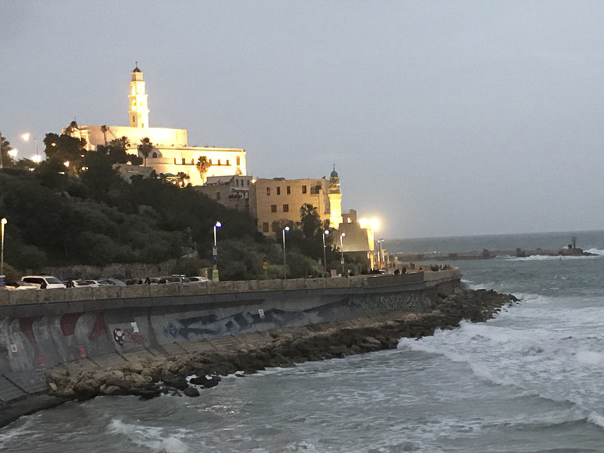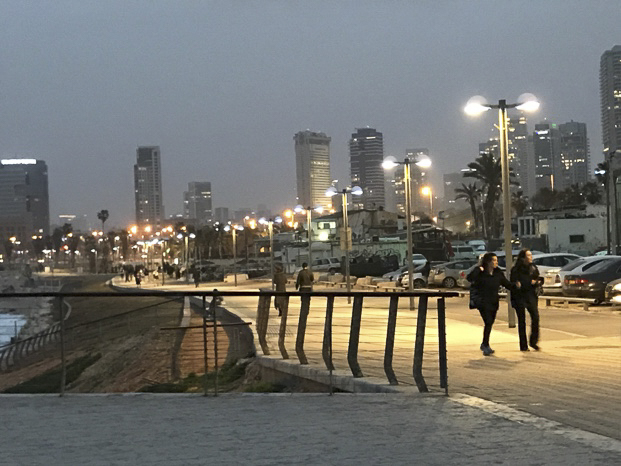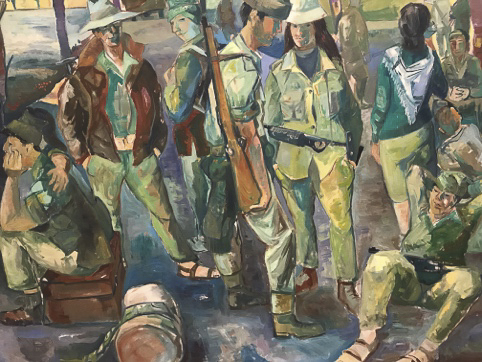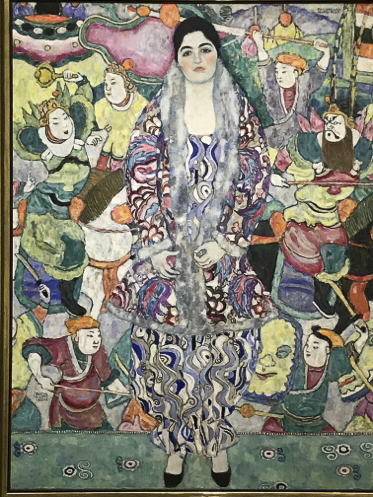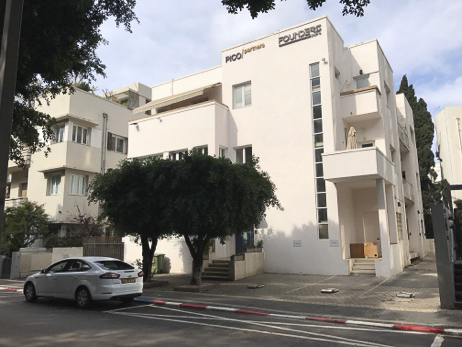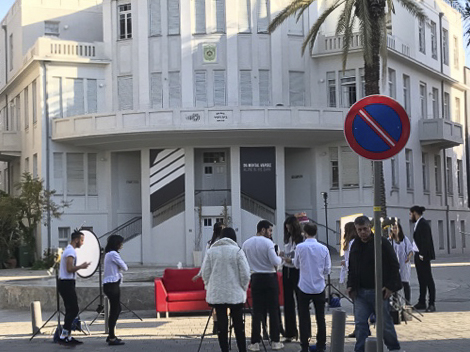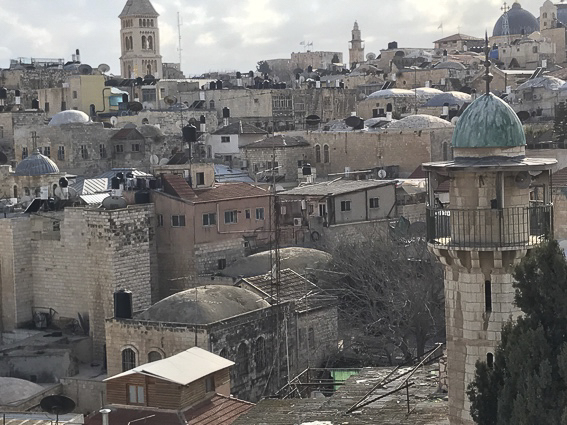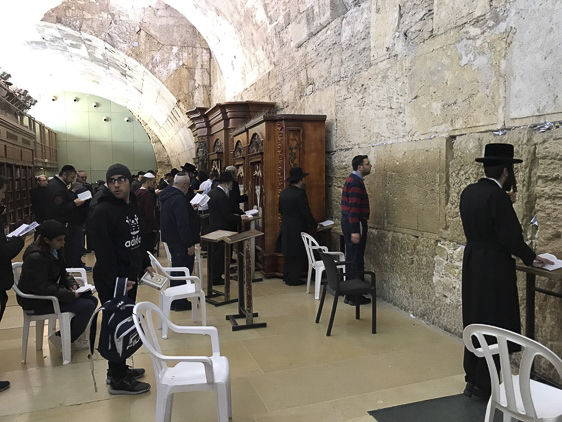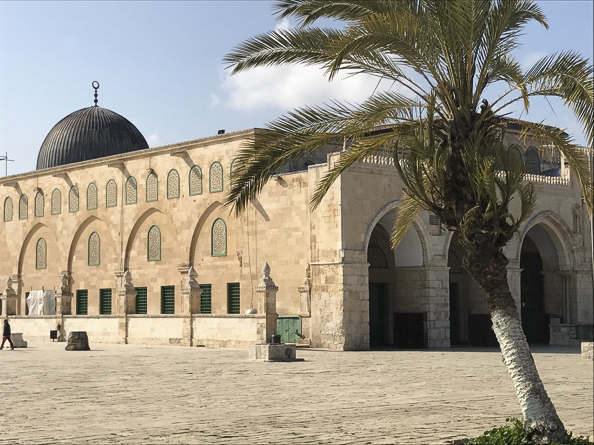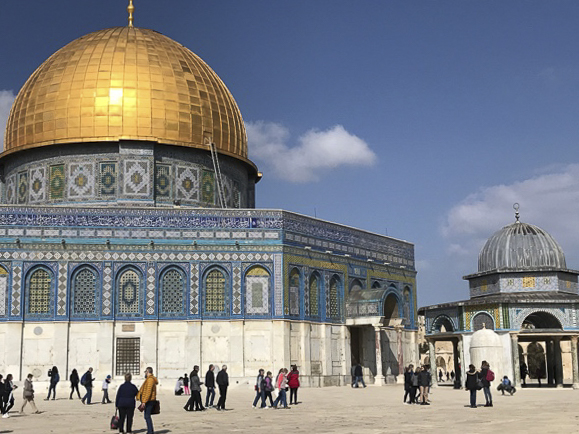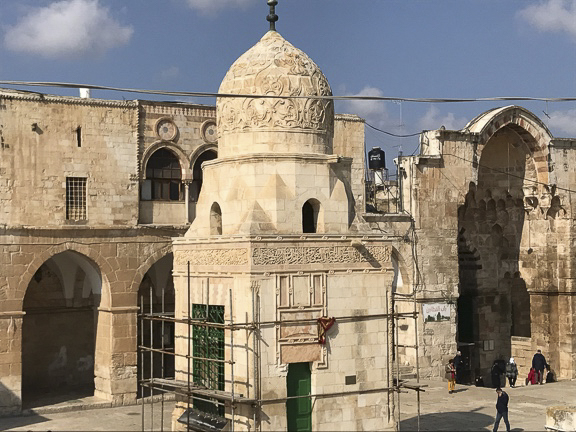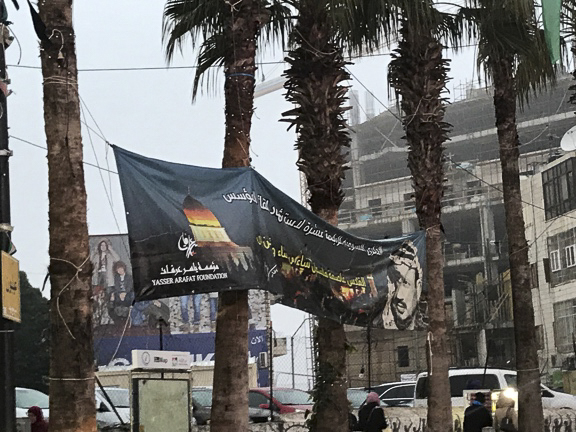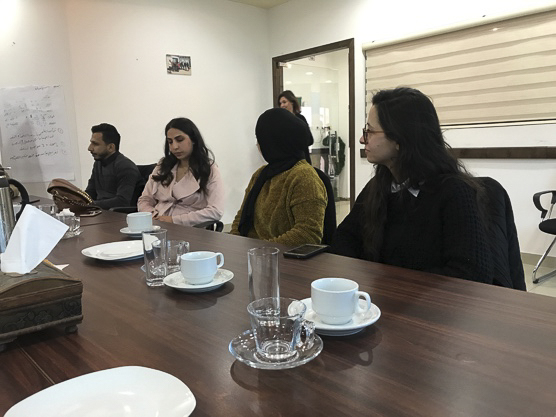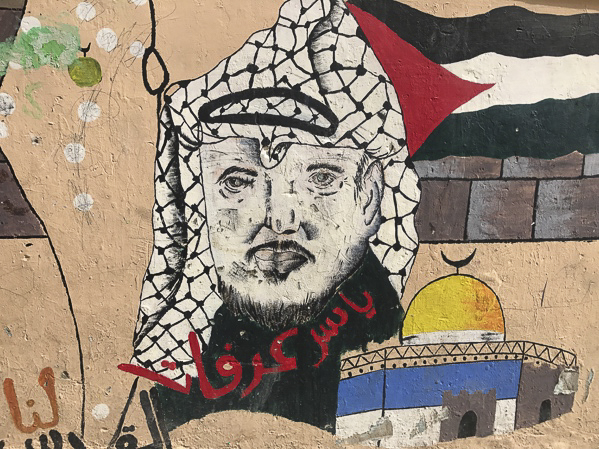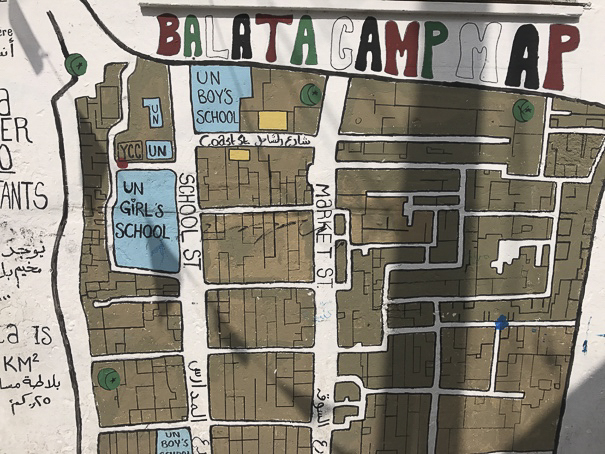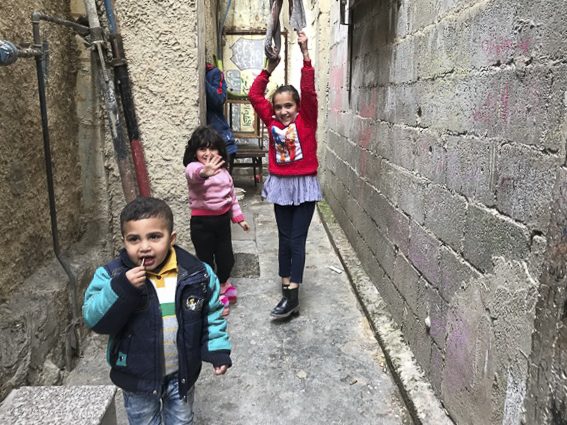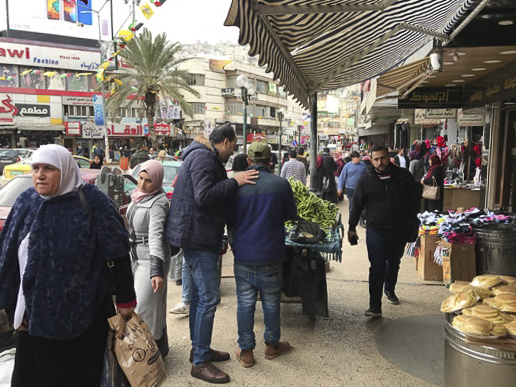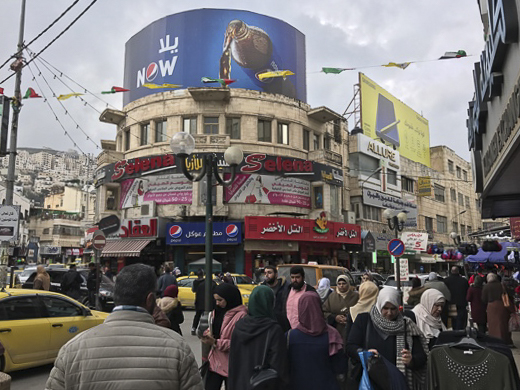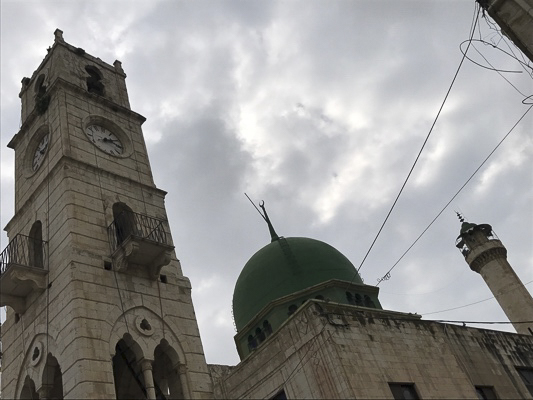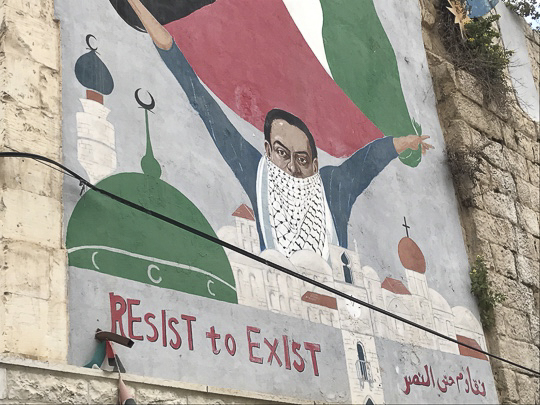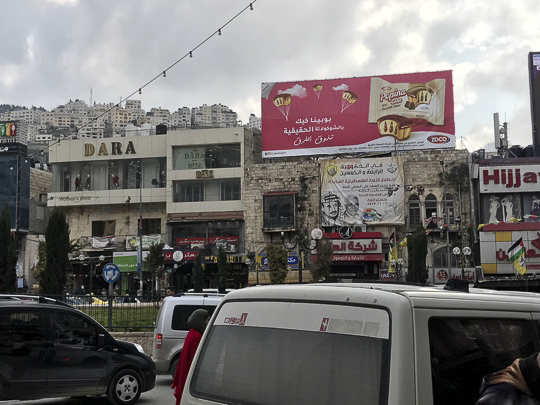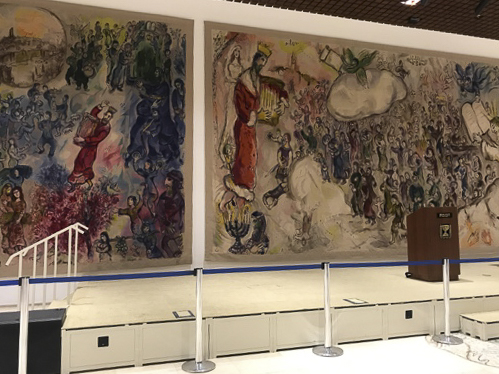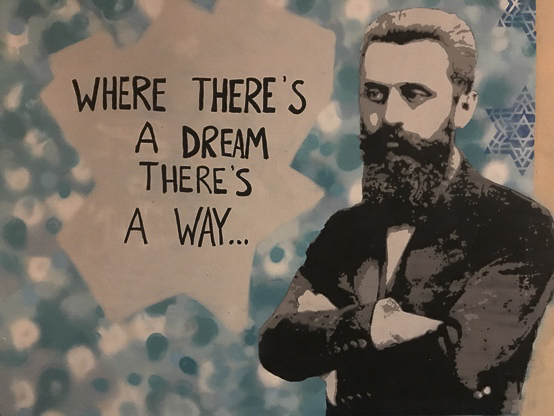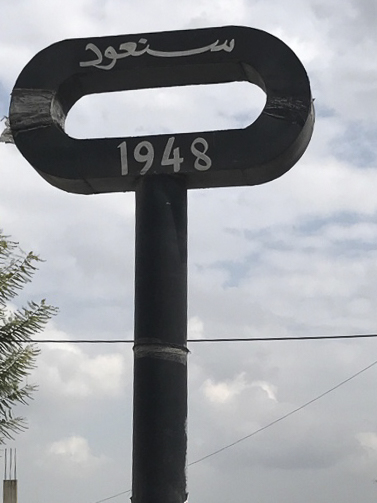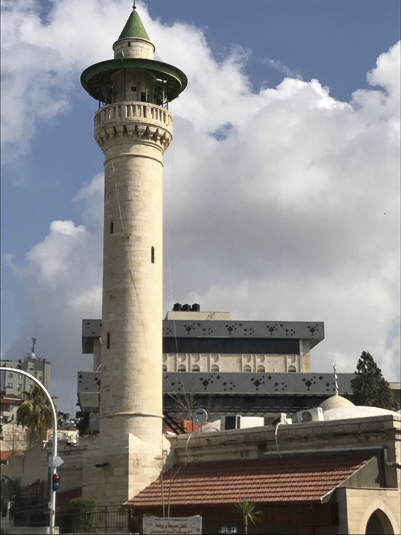ISRAEL – ON THE WAY TO PEACE OR TO WAR?
A visit to Israel and Palestine before Israeli elections
Israel and the New Middle East: new alliances promoted by PM Netanyahu
Going to Israel/Palestine these days is certainly extremely interesting, but when was it not? Often it is too interesting, so also these days, some weeks before the elections in Israel. New developments inside the country and in its neighborhood show growing tensions. The long term Prime-minister Bibi Netanyahu is in strong alliance with President Trump and they have a common enemy: Iran. They have common allies on their anti Iran stance: Saudi Arabia and several other Arab countries. For the Israeli Prime-minister it is a big success to have found in the new American administration an ally who is even more skeptical about serious peace negotiations with the Palestinians. The cutting of the financial support to them, which is predominantly effecting Palestinian girls and women, is a clear demonstration of this special ugly side of the new US policy.
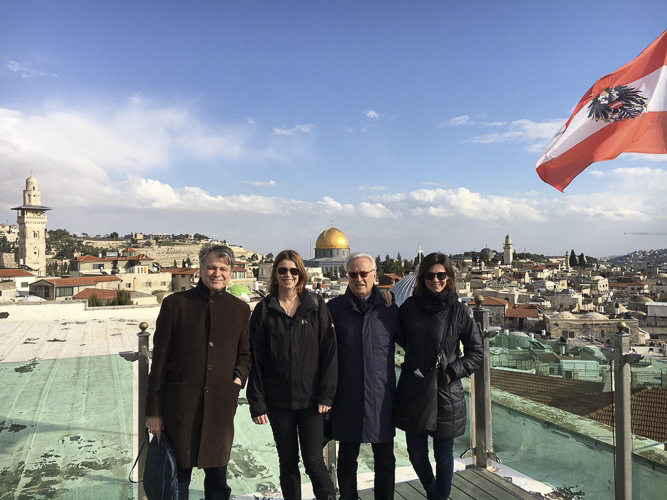
Just before Stephanie Fenkart, the director of the IIP and myself together with Gudrun Kramer (Peace Centre in Schlaining) and Wilfried Graf (Kehlman Institute) went to Israel, Poland organized on behalf of the US President a meeting on the Middle East in Warsaw. US Vice-president Pence and States Secretary Pompeo were the most prominent guests – and of course Prime-minister Netanyahu. Vice-president Pence warned even, that Iran was preparing a new Holocaust. This is certainly an ugly misuse of the Nazi systematic crime against the Jews. But such a misuse is certainly welcome by Netanyahu who again and again is seeing in the Iranian regime his favorite enemy.
Nevertheless Netanyahu was at the end not the star of the Warsaw meeting, because he criticized the Polish attitude towards Polish collaborators of the Nazis and the relevant legislation de facto denying such collaboration. The Polish President advised Visegrad leaders to cancel their planned meeting in Israel, which was anyway several times postponed. It is interesting that Netanyahu for once criticized a right wing government with whom he seeks an alliance. Concerning the Hungarian Prime-minister Orban and his at least tolerant attitude towards anti-semitism he did not find critical words. There was long discussion about the meeting to be held in spite of these remarks, but even worse remarks of the Israeli foreign minister brought the Polish Prime-minister to cancel his participation.
Anti-semitism
Concerning anti-semitism there was also a special and controversial case in the US Congress. One of the newly elected young member Ilhan Omar was criticizing the – especially financial – influence of the Israel/Jewish lobby in US politics. An enormous uproar including from the Democratic leadership was the consequence. Certainly she was raising a critical point concerning the US attitude towards Israel (extremely positive) on the one side and the – negative – attitude towards the Palestinians on the other side.
But as a balanced comment in the Israeli paper Haaretz made it clear it is not so much a question of money – perhaps they underestimated it – but an ideological issue: “ The reality is much more complicated and it does the Palestinians no favor to embrace an overly simplistic outlook that sees American Israel lobby money as the lynchpin holding the occupation in place. Much of Israel’s political cachet in American domestic politics comes from the Evangelical Christian community….. Omar ignores how uncritical U.S. support for Israel evolve from very American cultural motifs.“ Anti-semitism is an ugly and dangerous attitude but so is islamophobia and any other attitude of racial prejudice. And often they go hand in hand. But the evangelical extremists in the U.S. do not care, they feel them-self supported by God. As the radical, religious right in Israel. And together they have a strong influence on American policies.
Whatever, if money or religious ideology contribute more to the American strongly pro-Israel policy, American politics are very one-sided and became awfully partial and dangerous with President Trump. The measures against the Palestinians and one sided and premature fixations about basic elements to be negotiated in the peace process are endangering peace and a fair solution of the Palestinian question. In addition, one really can have the impression that Trump is planing and preparing a new war: an attack against Iran. When the Nr. 2 of the U.S. administration is accusing the Iranian leadership to prepare another holocaust and when so many Arab leaders see in Iran the major enemy and agree in this respect with Netanyahu a new war in the Middle East seems not impossible.
Has Iran to fear a military attack?
Unfortunately Iran’s policies are offering many opportunities and reasons to its enemies to ask for punishments. The promise of the former Iranian president Achmedinishad to erase Israel from the world map, the unequivocal support for Hezbollah in Lebanon, the strong political and military support for President Assad in Syria with the intention to keep a strong military presence in this neighborhood to Israel , an – if even limited – support for the Houthis in Jemen etc. all these actions must provoke Israel on the one side and Arab Sunni countries and regimes on the other side These regimes are in no way innocent. But a non-Arab, Shiite country cannot try to gain additional influence to the detriment of its neighbors without provoking retaliation. And finally the common enemy is creating alliances between Israel and Arab countries.
In this respect we certainly have a New Middle East. Even with a withdrawal of US troops from Syria, the US did not really disengage from the region. They want to stay in Iraq in order to control (and even attack?) Iran from there. They want all the countries of the region including the Shiite dominated Iraq to cancel their energy connection with Iran and follow the US sanctions. Which would result in an economic disaster. And the obedience to US sanctions should finally also be met by Pakistan, Afghanistan and India. So the war is already here, for the moment it is an economic war, but if it would not succeed to topple the Iranian leadership „peacefully“ an outright military intervention – perhaps some month before the next presidential elections – could do the rest.
For the moment at least the animosities expressed against Iran and the clear intention to reach a regime change is enhancing the opposite. Instead of accepting the American/Israeli/Arab challenge and trying to find a way of compromise the Iranian leadership is closing its ranks behind the extremist forces. For a change in this course it is anyway to late. Much will depend on the attitude of Russia and its readiness to defend Iran in ace of an attack. That would of course bring a new dimension into the scenario with many dangers for peace and stability in the region but also in Europe.
The latest edition of Newsweek spoke on its first page about „America’s next phony war“ and asks „Will Iran be Trump’s Iraq?“ Besides the cancellation of the nuclear (JCPO) agreement with Iran there are many signs of a hard line policy of the US. Especially the strong support given to the terrorist organization Mujahedeen (MEK) by Security Adviser John Bolton and Rudi Giuliani, Trumps lawyer makes it clear what the US intentions are. So a war could be started by Israel or the US or be the result of a close alliance between the two and some Iranian terrorists.
Netanyahu has an influence on the U.S. administration as no other Israeli leader before. For the moment Israel is fighting Iran in Syria and partly in Lebanon. But Israel fears the development of the Iranian bomb. And many Israeli see in the Iranian leadership an irresponsible force who will use the bomb to at least threaten Israel if not try to eradicate it. Therefore the JCPO, the agreement concluded in Vienna, had to be canceled. But nobody of our interlocutors could say what the alternative would have been.
Anyway, if no new agreement could be found, a military attack in order to destroy the nuclear installations would be necessary. And some Arab countries would be ready to participate or at least would be happy to see Iran humiliated and bombed. Of course Iran would not sit by idle. New fighting in and from Iraq, Syria and Lebanon would be following. The question would be how Turkey and especially Russia would react. And concerning Europe, Netanyahu is constantly trying to split the EU by wooing the right wing parties, irrespective of their open anti-semitism. But their islamophobia and their extremely restrictive refugee policy is uniting them ideologically.
Netanyahu has also built up a close cooperation with Cyprus and Greece concerning the maritime gas in their joint waters and via Cyprus also with Egypt. So one cannot say, that Netanyahu missed many chances to conclude alliances and win at least partners if not friends. But nevertheless or maybe because of that strength gained by the Israeli leader, the region remains a powder keg. It could easily explode.
What is new in the New Middle East?
It is always difficult to define a changed situation as new. There are always new developments, but do they really create a new era, a new political constellation? Seth J. Frantzman recognizes in an article in the International Jerusalem Post „tectonic shifts which have taken place in the last few decades“. Most of the leaders who were growing up and active in the post-colonial era are dead. A younger generation took over, but they are not more willing to find peaceful domestic and international cooperation as a lightning rod. In addition new alliances have been created and are partly opposed to each other. „The region is now increasingly influenced by two rising alliance systems. Iran and its proxies and clients in Iraq, Syria and Lebanon and Yemen represent one system, while Turkey and Qatar, as well as as their partners in northern Syria, Libya and Sudan and elsewhere, represent another“.
These two forces are – according to Franztman – opposed by the alliance of U.S., Saudi Arabia, Israel, the UAE, Egypt and the Kurdistan Regional Government in northern Iraq. Of course one has to add Russia to that Middle East puzzle, a country which had got an increasing role parallel and due to the decreasing role of the U.S. Much will depend how far the U.S. is withdrawing from the Middle East and how far it will lead „from behind“ with its allies, especially Israel and Saudi Arabia. And there is the question how much Israel is able to win sympathies and support from Arab countries who are ready to forget the plight of the Palestinians and who are defining Iran as a „toxic country“ as some Arab countries did in their recent meetings with Prime-minister Netanyahu.
But for the moment we truly can speak about a New Middle East, because of new actors from Turkey to Russia – including Iran – and new alliances with Israel as a de facto ally in the anti-Iran Arab camp. This is parallel to a decreasing role of the Palestinian question in Arab political considerations.
More weapons (including nuclear arms)
As mentioned above the New Middle East is characterized by the immanent threat of a war between Israel and/or U.S. with Iran. And one of the frightening elements of the New Middle East is the fact, that seven out of the top ten countries that spend the highest GDP share on defence are located in the Middle East. And between 2013 and 2017 the the volume of arms purchase doubled.
Saudi Arabia plays a decisive role for a potential power shift and eventual war in the Middle East. It is also interesting to see, that the Trump administration was and is eager to offer Saudi Arabia nuclear facilities without the necessary guarantee for not using it for developing the bomb. According to the New York Times about an interim report from the US House Oversight Committee the Trump Administration is acting besides and against the law: „Negotiations were conducted by people who would stand to gain millions, in apparent disregard of the Atomic Energy Act of 1954, which sets out explicit procedures and criteria for nuclear cooperation agreements and is intended to thwart proliferation of atomic weapons…… It’s no surprise that the Saudis would prefer to negotiate over nuclear technology with Mr. Trump, who seems to care far more about profits than about halting the spread of nuclear weapons.“
And the recent visit of the Saudi Crown Prince Mohammed Bin Salman (MBS) to Pakistan is also interesting in that respect. The Crown Prince brought a lot of money with him. And what did Pakistan offer? There is a long-standing and partly scandalous cooperation between Pakistan, which developed the bomb and Saudi Arabia concerning the nuclear issue.
The Yemen war – a symbol for the Middle East
In fact there is already a war between some Arab countries, the US and Israel against Iran – the war in Yemen. According to a contribution in Haaretz „Yemen’s war is mercenary heaven“. „Israeli cyber companies, gut traders, terror-warfare, instructors and even paid hitmen operated by an Israeli-owned company are partners to the war in Yemen“.
And of course many Americans are very actively participating in that war. „Private American companies, senior officers and ex-CIA agents found their bonanza“ in Saudi Arabia and the United Arab Emirates. The war in Yemen is also a sign of the New Middle East, an unofficial war of Arab countries in alliance with US and Israel against allies of Iran. It is a proxy war and a hybrid war at the same time. So far to the geo-political and regional background to our visit.
Tel Aviv
Our first stop on a fact finding mission was in Tel Aviv. Tel Aviv, even on Shabbat, impresses the visitors by its openness and liveliness. Perhaps it is also its location at the Mediterranean Sea and its lively sea front that this openness it clearly visible. It is also much less religiously structured and dominated. One has not the impression to be in a domestically and internationally embattled country. And it is always voting left, at least until now. One of our interlocutors made even a joke and said we should discuss and prepare a declaration of independence from Israel.
Only at the Tel Aviv Art museum some of the pictures of the time during and after the foundation of Israel, one is reminded of the fight for independence against the British and against the Arab inhabitants. But most of the paintings are donated by some rich couples and contain wonderful works of art including an extraordinary painting by Gustav Klimt.
Tel Aviv is also architecture wise interesting because of the many Bauhaus and International Style buildings. They are partly renovated but many of them still wait for refurbishment. But perhaps this lack of over-renovation and tidiness gives the city a very human appearance. Unfortunately Jaffa the former „suburb“ of Tel Aviv has lost its Arab character and population and became more and more just an extension of Jewish Tel Aviv. Only some of the old buildings and Mosques remind the visitors of its Arab past. Since 1950 the official name for the city’s on the Mediterranean Sea is Tel-Aviv-Yafo. In total the population is about 438.000 and only 41.000 are non-Jews.
What is also visible in Tel Aviv are signs of the inner Jewish fight before and at the eve of independence. One monument on the shore reminds – alas in a very crude way – people of the Altalena affair. The Altalena was a cargo-ship – named after the name under which the right wing Zionist Jabotinsky was writing. With the support of the French government it brought 1948 weapons for the radical and violent group Irgun (under command of Menachim Begin, who later became Prime-minister).
The provisional government headed by David Ben Gurion did not want to tolerate a competition of force by this irregular and extremist military group, especially after an agreement of introducing it into the Israeli Defence Force – in which already the later Prime-minister Ytzak Rabin played a decisive role – has been found. Few people on both sides have been killed and not some hundred as the inscription on the monument implies. But it shows how misleading such monuments can be, instead of trying to enhance understanding for historic events and their complex background. And that is also typical for both sides in that Israeli/Palestine conflict. Every side sees only its virtues and the failures and crimes of the other side.
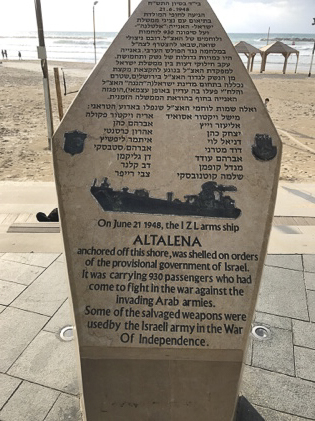
Jerusalem
Going from Tel Aviv to Jerusalem is like going from one country to another. Even Jerusalem as such is divided into a clear Arab and Jewish part, although on the last decades Jewish influence became greater also in the Palestinian areas. But it is also the religious determination which characterizes Jerusalem in difference to Tel Aviv. The famous and courageous Israeli writer Amos Oz described the „Jerusalem syndrome“ in the following way: „no sooner do people breathe in the crisp mountain air (‚clear as wine‘, in the words of one famous song) than they set off to burn a mosque or blow up a church or destroy a synagogue, to kill heretics or believers, to ‚eradicate evil from the world‘. Most sufferers of ‚Jerusalem syndrome‘, however, make do with stripping down, climbing atop a rock, and prophesising.“
The problem is that the religious influence and very often a radical orthodox influence became stronger and stronger in the last years. Prime-minister Netanyahu was very active in strengthening this influence by forming coalitions with orthodox political parties where radical rabbis had a big influence. And also on the „other“ side, the Arab side radical Islam got a stronger foothold amidst the population. Extreme religious and political beliefs with all its promises and prophesising are seducing more and more people. In the end the ‚Jerusalem syndrome‘ is spreading beyond the city itself even when it is here specially visible.
A visit to Temple Mount with the Golden Dome and the Al Aqsa mosque is showing a panorama of churches and places of beliefs and worship. It could be a symbol of peace between the different religions but unfortunately it was again and again a place of fights and destruction. And it became recently again a symbol of how one religion and state is suppressing another belief and people. So the fascinating view from the Mont Temple is violated once one thinks about the reality on the ground. And the very evening when we visited Temple Mount New clashes between Palestinian worshippers and the police created new tensions.
Is peace in Palestine still possible?
With political instrumentalisation of religion – or vice versa – the question if peace is still possible is more and more justified. And in addition to this dangerous mix of politics and religion, the underlining of many domestic and external threats is also strengthening the peace deniers. The present Prime-minister Netanyahu is especially able to name a lot of enemies. The Arab population of Israel is dangerous because they could influence politics if well represented in the Knesset, the Palestinians outside of Israel are suspected to support terrorism, the left is weak and ready for foul compromises and therefore a security risk, the NGOs all are distributing lies and fake news about Israel and of course Iran is the biggest enemy in the region.
The famous Israeli writer David Grossman characterized the situation quite realistic: „I do not remember ever hearing any serious statement about hope from Benjamin Netanyahu or from any of his ministers and advisers. Not even one word of a vision of the possibilities a life of peace could offer or about the chances that Israel could become part of a new fabric of alliances and interests in the Middle East. How did even the word itself, „hope“, become a dirty, incriminating word, second only to the word „peace“ in its dangerous levels of radiation?“
All the attacks against the „enemies“ of Israel have been successfully weakening the peace movement in Israel. Nevertheless several individuals and organizations do not want to give up and look into possibilities to overcome the hurdles and obstacles to an agreement between Israel and the Palestinians. Some believe that only a common state can be the future – due especially to the settlements having been implanted in the Palestinian areas proper. Others think and argue, that a two state solution is still possible. And others argue for a special form of two states combined with joint institutions, sharing a ‚common land‘.
Two states – one state- confederation etc.
One of our interlocutors, he represented the dominating right wing party, Likud, was very clear in his opinion: the status quo is the best situation for Israel. On the other side there is no responsible force. The Palestinian leadership is defending and protecting the terrorists and not ready for serious talks and compromises. The fate of Palestinians is terrible, but for the moment Israel has to use its strength to dominate the Palestinians. But there were many other Israeli interlocutors who saw things differently and were afraid that things may explode – in the West Bank and especially in Gaza. So they were looking for solutions which could overcome the status quo.
Let’s start with those who still believe in the possibility of a two state solution. The core issues which have to be dealt with in a peace treaty are the borders of the two states, the question of Jerusalem, the refugees issue and the question of – Israeli – security. For all these issues technical solutions are difficult but possible. Concerning the borders the settlements are a difficulty, but the majority of the settlements are near the „green line“ which is dividing Israel and Palestine according to international law and perception. So a land swap between the two areas could solve the border issue. Jerusalem as capital of both states can be divided into the Western part for Israel and the Eastern part for Palestine and a special regulatory regime has to be found for the old city with its religious entities.
Concerning security, modern technologies can be used to guarantee Israel’s security without having boots on the ground. Israel as a high tech country – especially concerning the military and police side – is certainly able to defend its-self without military presence in the Palestinian area. Joint operations of security forces and data sharing would also not be totally new for Israel and Palestine, especially when it is Israeli dominated as now. In addition to that international military and police forces can help to meet Israel security concerns.
Certainly the biggest emotional issue is the right to return of all the Palestinian refugees in today’s Palestinian territory, in Jordan, Lebanon and Syria. Israel (the Jews in Israel) will never accept to be „overtaken“ by Palestinians in changing the demographic/ethnic structure of the country. Maybe they could live with giving a right to return to those and only to those, who lived in 1948 in Israel and left or had to leave. It is also not possible that all refugees can be invited into a still fragile new Palestinian state. Anyway with a peace agreement an international donors conference would be needed to support the new Palestinian state and those countries who have many refugee families in order to integrate them into their states – economically and perhaps also legally. But they may choose also the Palestinian citizenship without automatically having the right to settle in Palestine.
Lack of political willingness
It seems that for all the issues difficult but manageable solutions can be found. But what about the political willingness to compromise. There we find a lack of courage and creativity to look into a future of peace and mutual understanding by both leaderships. And of course one should not forget the emotional side of accepting also the perspective of the other side by Israeli and Palestinian citizens: the other side, which often has been demonized and certainly was also guilty of crimes.
First one has to overcome the lack of knowledge of citizens about the desires and ideas of the other side. Many young people live their lives without taking note of the other side. Then one has to take fears and anger seriously. In that respect it is not sufficient to start a dialogue between the Palestinians on the one side and Israelis on the other side, also an intragroup dialog must be added. And in the end an intrapersonal dialogue must clarify personal emotions and create readiness to leave prejudices behind and open up for new „adventures“ and the unknown.
The question is not so much if two states are technically feasible but rather if there is a willingness of creating two states – especially on the Israeli side – and how unequal the two states will be concerning sovereignty and self-government. New initiatives to undertake a serious debate within the Israeli society have at least two Members of the Knesset announced, when we met them at our visit to the Knesset. But both will leave the Knesset – one did not run again and the other is very unlikely to be elected due to his position on the party list. Both are very active and hope to mobilize public opinion for a two state solution, whose support dropped from 80 to 60 %. But still what conditions Israel will set for creating a Palestinian state is still open. Anyway also the US will certainly demand from Israel less than from Palestine.
In addition we have to recognize, that the Palestinians are not homogenous and do not express the same interests. There are those who stayed in Israel also after 1948 – and their families. There are those who are still living in refugee camps and those who live in villages and towns in the Palestinian territories. And then there are the Palestinians of East Jerusalem. And those who live in Gaza. In addition you have political differences between Fatah and Hamas and different opinions inside these two political groups. So for any political leader of the Palestinians as for Abu Mazen it is nearly impossible to express a common ore even a clear majority opinion. And there are those who believe that anyway the situation will deteriorate and a revolt may start which will enforce a new framework for the Palestinian and Israeli people living together or at least side by side.
Whatever the way towards a new framework for creating a Palestinian entity (let’s call it state) many links and connections will have to be established from water services, energy and transport infrastructure to security. The countries are too intertwined to allow a total separation. But first a framework must be commonly established. And here the „International Community‘ especially the EU and the U.S. could help. One of our interlocutors in the Knesset expressed his conviction that the two parties alone never would come to an agreement. Only with a clear timeframe and some arbitration by outside parties concerning those points whom the parties themselves could not agree on, could bring a solution.
Some plead in contradiction to a two state solution for a common state. Whatever the merits of a common state would be, many regard it as not achievable. It will have to be some sort of confederation light of two states. Already in the original plan of creating two states 1947 there were some common elements foreseen.
The „United Nations Special Committee on Palestine Report“
(UNSCOP) demanded an economic unity „to the extent feasible, and consistent with the creation of two states“. The report speaks about the „creation of an economic union“ and a „common currency system, and the maintenance of a country-wide system of transport and communications“. And already then it was clear that the Arab part would be much poorer and would need financial support for establishing a viable economic and political system.
Amos Oz is clearly supporting the two state solution: „We cannot expect Israelis and Palestinians, after a hundred years of blood, tears and catastrophes, to jump into a double bed together and begin their honeymoon… The Palestinians and Israelis cannot turn into a happy family overnight. We need two states. Sometime later there might come cooperation, a joint market, a federation.“ These are certainly good and convincing arguments. Nevertheless, I think that the two states need from the beginning common authorities and institutions. Why should elements which are binding them together today – even with imbalances and inequalities – be cut off? It would be better to correct them and create cooperations on an equal footing.
Stuck in the states quo
In all that thinking Jerusalem is a special case. Both parties see in Jerusalem the long awaited capital. For both sides it is a dream they want finally fulfilled. But only Israel could create facts. And it did so by separating it from the Palestinian authority and from the Arabs in Israel. In a frank discussion with a representative of the younger generation he expressed clearly that more and more of his colleagues adapt themselves to being part of Israel – but without full rights. Very honestly he said: “ We already lost the battle for Jerusalem and Trump finalized the defeat. We are clearly defeated.“ Jerusalem could be one of the symbols of living together peacefully if the basis would be equal rights and opportunities.
But for the moment the most likely outcome of all discussions is that the New Middle East will be stuck with a new/old status quo. As Douglas Bloomfield was writing recently in the Jerusalem Post: „There will continue to be meaningless conferences like the one in Warsaw, the US will continue to disengage from the region, Israel and the Arab states will pursue their relationship in the shadows and the Israelis and Palestine, plagued by poor leadership, will continue their low-level violence, interrupted by an occasional war – that will become the new status quo.“
Ramallah
Going into Ramallah in the West Bank is again like traveling into another world. Even if the Israeli checkpoints are not as fierce as I remembered them from my last visits, the poverty of the inhabitants and the environmental degradation is clearly visible. And the West Bank is not characterized by the worst economic situation. Gaza is in a much worse situation. Because of Israeli reaction to Hamas „governing“ this part of Palestine but of course also due to Hamas policies and somewhat crazy belief to „throw“ the Israeli/Jewish people „into the sea“. The division inside the Palestinians political scene is a big obstacles to have a clear strategy how to end occupation and force Israel to negotiate seriously.
A recent meeting in Moscow which should bring the different fractions together failed, because the two extremer groups, Hamas and Djihad refused to sign a common document. So reasonable and constructive politicians in Palestine are confronted with a double check: Israel’s continues occupation and divisions inside their own ranks. And perhaps Iran and Turkey which were also represented at Moscow have no big interest in establishing an united Palestinian front with a realistic political position.
Nevertheless most of our interlocutors were less depressed than at my last visit. And that although the hope of finding a solution has been dashed again and again by the Netanyahu governments. The representative statutes of some smaller left-wing parties were of course especially disappointed by the U.S. administration under President Trump.
The transfer of the U.S. embassy to Jerusalem and specifically to East Jerusalem, which is still seen as the capital of a future Palestine and the cutting of the contribution to the Palestinian refugees and to many projects in the West Bank heave been heavy blows to the Palestinians. And this in addition to heavy cuts of tax money owned by the Palestinians but collected by the Israeli. This is a clear breach and violation of the Paris Agreements but that does not bother Prime-minister Netanyahu. Nevertheless all the party representatives we met longed for peace and sticked to the two states resolution. Their patience with the Israeli occupation is enormous and not comparable to any other people. What most political representatives criticized was the Warsaw conference where prominent Arab politicians sat side by side to Prime-minister Netanyahu. This was seen as a clear treason by Arab leaders. But some small hope that peace and perhaps with help from Arab leaders remained.
The somewhat different view of the young
It is somewhat different with the younger generation. In opinion polls the general public still hopes for a two states solution, but a rising number of people can also imagine to leave in one state as they see more and more land robbed by the settlers. This rising tendency is specially visible with the younger generation. We met several of them and all the possible solutions were expressed by them. Those who were pleading for a one state solution were insisting on the implementation of the same rights for everybody and hoped that could be realized by a common state. Nevertheless several of them hoped that this one state can be called Palestine. One participant expressed her feelings: „I am done with violence“ and „I am fed up with losing friends“ and „We want to be treated as human beings“.
Overall most of the young are disappointed by their own political leaders. They have been negotiating for many years without results and a wide spread corruption is affecting the political and economic conditions in the country. Many of them complained that while Israel has the U.S. as a permanent protector and supporter, Palestine has to fight alone. And Europe is very soft and hesitant in supporting Palestine. And even the formal recognition of Palestine as a state was only done by Sweden.
Some of the young refugees hoped to go „back“ to their homes, from where their parents or even grandparents were evicted. It is understandable that the nostalgia to the home-land has been transferred also to the younger generation especially in the refugee camps. But at the same time unrealistic hopes have been nourished. About 70 % of the refugees inside Palestine have already left the camps and founded a home in Palestine, but still up to 30% live in camps. They do not leave the camps because of poverty but for many years the ideology of having to be prepared for a return has been promoted. And the real or symbolic key of their homes should remind everybody about their quest to return home.
The reality of refugee life we could see in a camp near Nablus. Balata comprises about 20.000 refugees. Many already left the camp and bought land and built houses nearby. But the poorer part of them, who could not afford houses and especially running cost like for electricity and water stayed in the camp. Life in the camps is not easy and many conflicts are escalating into real fights with weapons. A social and cultural worker who lead us through the camp, explained, that after the common cause of fighting against the Israeli occupation failed, the fighting against each other was in in increasing. Families against families are fighting and often with weapons. In addition the Palestinian security forces are having incursions into the camp like the Israelis into Palestinian villages and the young are attacking the police if they come into the camps. This happened for example only the night before we visited the camp. The major conflicts nowadays are not with the Israelis but with the Palestinian security forces.
The whole stories from the camp but also many stories we heard in the last days show an increased fragility in the Palestinian society. The present leadership is not able to bring the different groups together and develop a common strategy. Certainly the conditions of occupation makes things not easy. But corruption inside the political class and bureaucracy in the administration as well as a very strict and authoritarian security regime develop more and more a gap between citizens and leadership. Mistrust is already big and getting bigger.
Nablus – Palestinian normality
Visiting Nablus after the camps of course was relaxing. A lively city presented itself with an extended market and many friendly people. Yes, its old and magnificent buildings need a lot of restoration, but many call it little Damascus. Well of course they mean the old Damascus, before the war. But also here the Israelis are present insofar as the incursions into the old city during the first Intifada is still remembered. A plague on one of the walls even pleaded not only for not forgetting it, but also for not forgiving the killing of people during that incursion. But all these emotional appeals will not help to find peace. The problem is that it would be easier to work for forgiveness if a peace agreement would be found. But the Israelis could at any time come again and occupy the city. Under these conditions, forgiveness is less possible and probable than if an agreement would be concluded and a common peace work would begin.
Dialogues across the borders
Nevertheless many people are still working in order to find peaceful solutions. But less and less people especially the young ones know people from the other side. Israel’s physical and psychological wall is preventing such encounters. And the Palestinian side is also preventing regular meetings, because they want to prevent a normalization. They do not want people to people contacts. Often people who still do have contacts are seen as suspicious or even as traitors. Fortunately there are citizens on both sides who will not give up the necessary dialogue. Certainly especially the Palestinians have to reform their own society and political system. But parallel to serious reforms such dialogues across the borders and walls are necessary. And the same is true for the Israeli side. The nationalistic and xenophob tendency must be countered but there must be also a continuous dialog with the Palestinians.
The work inside their countries is hugely dependent on the bilateral dialogue. And it is good to see and to hear, that some Israelis are not following the right wing argument, that criticism of Israel is equal to anti-semitism. This is a favorite weapon used by many right wing Israeli politicians and media. It is a dangerous political weapon. Now there is a tendency even in Western Europe that also criticism of Zionism is equalized to antisemitism. That would be a strong victory of the right anti-democratic politics in Israel. Zionists who demand that all Jews should find their homeland in Israel should at least say how the homeland for the Palestinians can be established. And the Zionists should at least recognize the right of Arab Palestinians to create their own state.
The right for self determination must be valid for all people and it must be combined with strong minority rights. All these question are of high importance already today if we look to the definition of Israel as Jewish state. In all discussions of the possibility of one common state this question is even more vital and demanding an answer. Can a state which comprises Israel and Palestine be Jewish and democratic at the same time. These are questions which have to be answered for all states which give a clear dominance to a religion or to a clearly defined culture. It is a question for Israel as for many Muslim countries. The more Israel extends and expands itself, the more these questions become relevant.
Outlook
Visiting Israel and Palestine is always an up and down of feelings and emotions. A critical observer will always recognize a lack of willingness to compromise. He and she will miss the readiness of the stronger – Israel – to offer reasonable agreements, but they will also miss clear words of the weaker – Palestinians – to reduce fears and anxieties of the strong one. The fact, that Palestinians are without doubt the weaker ones does not excuse the lack of seeing the fears of the stronger one. And as unjust the occupation and colonialisation is, peace must be based on the willingness of both sides to find sustainable solutions. Today the burden of proof and of delivering offers are predominantly on the Israeli side. But Palestinians would be wise to offer ways to counter fears and anxieties of the Israelis as unfounded they may seem to them.
When you have an interest in finding an agreement you have also to understand the other side. My feeling is, that in Palestine many people and especially the officials are moving in that direction. But in Israel there is an „aggressive defence“ dominant, which always sees Israel and the Jews in general under attack against which they have to defend themselves. Yes, unfortunately anti-semitism still exist and new forms are arising. But there’s is also islamophobia rising. And racism is not only existing in non-Jewish circles. In Israel itself the right wing is playing with it. One of them was Rabbi Meir Kahane. His followers got the promise of Netanyahu to work with them in a new government after the election.
The Israeli newspaper Haaretz commented it: „The disciple-thugs of Rabbi Meir-Kahane, disseminators of hatred, racism and persecution of minorities, carrying the torch of homophobia and racial purity, won an entrance ticket into Israel’s legislature.“ And the commentator argues concerning Netanyahu ‚“there is no level to which he will not sink“. This is the right wing in many countries, they move themselves to the right and they are ready to go into coalitions with extreme right wing, even clearly racist parties. Netanyahu is certainly a pioneer in taking this course.
Dreams and realities
At a poster in Tel Aviv showing Herzl there was the sentence printed: ‚Where there’s a dream there’s a way“. But what is if there are not only different, but opposite, contradictory dreams? That is the case in Israel and Palestine. And dreams have often to be compromised in order to preserve some parts of the dreams. Palestinians already made many compromises. But for the moment the dreams of the Palestinians are meeting strong resistance and negation from the Israeli side. One should rather follow the forward looking definition of compromise given by Amos Oz in his essay „Dreams Israel Should Let Go of Soon“: „Choosing to compromise is in fact choosing life. The opposite of compromise is not pride or integrity or idealism. The opposite of compromise is fanaticism and death.“
With President Trump and his slogan „America First“ and his one-sided leaning towards a right wing and sectarian government in Israel the word compromise is not high on the political agenda. And therefore there is not much hope in the possibilities of the promised peace plan, which Trump calls euphemistically „Deal of the Century“.
And Europe? Where are politicians like Bruno Kreisky who would plead on the international level for a fair agreement after negotiations on a level of mutual respect. Austria could play that role but for the moment the government is only interested to improve or rather establish relations between its own extreme right and the extreme right wing government in Israel. What a missed opportunity to show a clear and constructive profile inside the EU policy.

